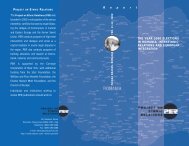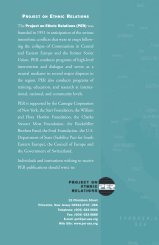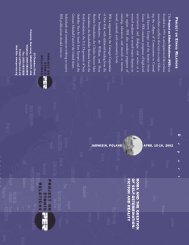New Majorities and Minorities in the Changing Balkans - Project on ...
New Majorities and Minorities in the Changing Balkans - Project on ...
New Majorities and Minorities in the Changing Balkans - Project on ...
You also want an ePaper? Increase the reach of your titles
YUMPU automatically turns print PDFs into web optimized ePapers that Google loves.
he argued, “when it comes to m<str<strong>on</strong>g>in</str<strong>on</strong>g>orities we must be realistic <str<strong>on</strong>g>and</str<strong>on</strong>g> cannotapply double st<str<strong>on</strong>g>and</str<strong>on</strong>g>ards. There can be cooperati<strong>on</strong> at many levels, but itmust always be transparent <str<strong>on</strong>g>and</str<strong>on</strong>g> based <strong>on</strong> comm<strong>on</strong> <str<strong>on</strong>g>in</str<strong>on</strong>g>terest <str<strong>on</strong>g>and</str<strong>on</strong>g> accord<str<strong>on</strong>g>in</str<strong>on</strong>g>gto comm<strong>on</strong> st<str<strong>on</strong>g>and</str<strong>on</strong>g>ards.” He declared that <str<strong>on</strong>g>the</str<strong>on</strong>g> Kosovo government “hasrespected <str<strong>on</strong>g>the</str<strong>on</strong>g> rights of m<str<strong>on</strong>g>in</str<strong>on</strong>g>orities at <str<strong>on</strong>g>the</str<strong>on</strong>g> highest level, <str<strong>on</strong>g>in</str<strong>on</strong>g> all our documents.We want <str<strong>on</strong>g>the</str<strong>on</strong>g>m to participate at all levels, even <str<strong>on</strong>g>in</str<strong>on</strong>g> government, but<str<strong>on</strong>g>in</str<strong>on</strong>g> an <str<strong>on</strong>g>in</str<strong>on</strong>g>tegrative manner, with<str<strong>on</strong>g>in</str<strong>on</strong>g> exist<str<strong>on</strong>g>in</str<strong>on</strong>g>g <str<strong>on</strong>g>in</str<strong>on</strong>g>stituti<strong>on</strong>s, <str<strong>on</strong>g>and</str<strong>on</strong>g> not to createparallel or alternative, aut<strong>on</strong>omous <str<strong>on</strong>g>in</str<strong>on</strong>g>stituti<strong>on</strong>s.”A participant from an EU country declared “it would be better for <str<strong>on</strong>g>the</str<strong>on</strong>g><str<strong>on</strong>g>Balkans</str<strong>on</strong>g> if <str<strong>on</strong>g>the</str<strong>on</strong>g> c<strong>on</strong>cept of ‘mo<str<strong>on</strong>g>the</str<strong>on</strong>g>r county’ lost some of <str<strong>on</strong>g>the</str<strong>on</strong>g> politicalweight it now carries, as ‘mo<str<strong>on</strong>g>the</str<strong>on</strong>g>r countries’ have not played entirelyc<strong>on</strong>structive roles. There are, <str<strong>on</strong>g>and</str<strong>on</strong>g> should be, limits <strong>on</strong> <str<strong>on</strong>g>the</str<strong>on</strong>g> rights <str<strong>on</strong>g>and</str<strong>on</strong>g>resp<strong>on</strong>sibilities of ‘mo<str<strong>on</strong>g>the</str<strong>on</strong>g>r countries’.” Ano<str<strong>on</strong>g>the</str<strong>on</strong>g>r participant declared “itis <str<strong>on</strong>g>the</str<strong>on</strong>g> collective resp<strong>on</strong>sibility of European states to protect m<str<strong>on</strong>g>in</str<strong>on</strong>g>orityrights through political <str<strong>on</strong>g>and</str<strong>on</strong>g> o<str<strong>on</strong>g>the</str<strong>on</strong>g>r means. But this must be d<strong>on</strong>e withgreat care.”An <str<strong>on</strong>g>in</str<strong>on</strong>g>ternati<strong>on</strong>al participant resp<strong>on</strong>ded to <str<strong>on</strong>g>the</str<strong>on</strong>g> vigorous discussi<strong>on</strong> bydeclar<str<strong>on</strong>g>in</str<strong>on</strong>g>g “This is a complex issue <str<strong>on</strong>g>and</str<strong>on</strong>g> it is an emoti<strong>on</strong>al issue, soemoti<strong>on</strong>al that I doubt that even most of <str<strong>on</strong>g>the</str<strong>on</strong>g> researchers would beable to discuss it without emoti<strong>on</strong>s.” He expressed c<strong>on</strong>cern that “<str<strong>on</strong>g>the</str<strong>on</strong>g>exist<str<strong>on</strong>g>in</str<strong>on</strong>g>g European framework is not sufficient <str<strong>on</strong>g>in</str<strong>on</strong>g> regard to <str<strong>on</strong>g>the</str<strong>on</strong>g>se issues”<str<strong>on</strong>g>and</str<strong>on</strong>g> called for “creat<str<strong>on</strong>g>in</str<strong>on</strong>g>g an <str<strong>on</strong>g>in</str<strong>on</strong>g>ternati<strong>on</strong>al framework <strong>on</strong> this issue. If weare creat<str<strong>on</strong>g>in</str<strong>on</strong>g>g a European cosmopolitan society, where all rules <str<strong>on</strong>g>and</str<strong>on</strong>g> lawsare universal, <str<strong>on</strong>g>the</str<strong>on</strong>g>re is no need for a mo<str<strong>on</strong>g>the</str<strong>on</strong>g>r state <str<strong>on</strong>g>in</str<strong>on</strong>g> a classic sense as weknew it today, a mo<str<strong>on</strong>g>the</str<strong>on</strong>g>r state that is tak<str<strong>on</strong>g>in</str<strong>on</strong>g>g care of its co-ethnics if <str<strong>on</strong>g>the</str<strong>on</strong>g>irrights are violated. There would be no such need if an overall Europeanc<strong>on</strong>cept is <str<strong>on</strong>g>in</str<strong>on</strong>g> charge. The European Uni<strong>on</strong> would become <str<strong>on</strong>g>the</str<strong>on</strong>g> mo<str<strong>on</strong>g>the</str<strong>on</strong>g>rcountry for all. Europe would be <str<strong>on</strong>g>the</str<strong>on</strong>g> mo<str<strong>on</strong>g>the</str<strong>on</strong>g>r for Kosovo, for Albania,for Serbia, <str<strong>on</strong>g>and</str<strong>on</strong>g> for M<strong>on</strong>tenegro. Under <str<strong>on</strong>g>the</str<strong>on</strong>g>se circumstances <str<strong>on</strong>g>the</str<strong>on</strong>g> <strong>on</strong>ly rolefor so-called mo<str<strong>on</strong>g>the</str<strong>on</strong>g>r states is <str<strong>on</strong>g>in</str<strong>on</strong>g> <str<strong>on</strong>g>the</str<strong>on</strong>g> cultural sphere. In fact, I am not sosure if <str<strong>on</strong>g>the</str<strong>on</strong>g> c<strong>on</strong>cept of a mo<str<strong>on</strong>g>the</str<strong>on</strong>g>r state is not dangerous <str<strong>on</strong>g>in</str<strong>on</strong>g> <str<strong>on</strong>g>the</str<strong>on</strong>g> 21st century.Because, if taken out of cultural sphere <str<strong>on</strong>g>and</str<strong>on</strong>g> cultural relati<strong>on</strong>s, it couldbr<str<strong>on</strong>g>in</str<strong>on</strong>g>g dangerous c<strong>on</strong>sequences; as it did <str<strong>on</strong>g>in</str<strong>on</strong>g> Yugoslavia <str<strong>on</strong>g>in</str<strong>on</strong>g> <str<strong>on</strong>g>the</str<strong>on</strong>g> 1990s, <str<strong>on</strong>g>and</str<strong>on</strong>g>even earlier, <str<strong>on</strong>g>in</str<strong>on</strong>g> <str<strong>on</strong>g>the</str<strong>on</strong>g> Sudetenl<str<strong>on</strong>g>and</str<strong>on</strong>g> <str<strong>on</strong>g>in</str<strong>on</strong>g> <str<strong>on</strong>g>the</str<strong>on</strong>g> 1930s.CONCLUSIONSParticipants <str<strong>on</strong>g>in</str<strong>on</strong>g> <str<strong>on</strong>g>the</str<strong>on</strong>g> roundtable shared a str<strong>on</strong>g c<strong>on</strong>sensus that <str<strong>on</strong>g>the</str<strong>on</strong>g> multiethniccharacter of <str<strong>on</strong>g>the</str<strong>on</strong>g> populati<strong>on</strong> must be reflected <str<strong>on</strong>g>in</str<strong>on</strong>g> <str<strong>on</strong>g>the</str<strong>on</strong>g> <str<strong>on</strong>g>in</str<strong>on</strong>g>stituti<strong>on</strong>s,policies, <str<strong>on</strong>g>and</str<strong>on</strong>g> practices of <str<strong>on</strong>g>the</str<strong>on</strong>g> Balkan states. The participants agreed thatm<str<strong>on</strong>g>in</str<strong>on</strong>g>orities should enjoy <str<strong>on</strong>g>the</str<strong>on</strong>g> same human rights as all o<str<strong>on</strong>g>the</str<strong>on</strong>g>r citizens,as well as extensive cultural rights required to preserve <str<strong>on</strong>g>the</str<strong>on</strong>g>ir identities,however <str<strong>on</strong>g>the</str<strong>on</strong>g>y differed <str<strong>on</strong>g>in</str<strong>on</strong>g> <str<strong>on</strong>g>the</str<strong>on</strong>g>ir views <strong>on</strong> <str<strong>on</strong>g>the</str<strong>on</strong>g> territorializati<strong>on</strong> of m<str<strong>on</strong>g>in</str<strong>on</strong>g>orityrights. Political equality, reflected <str<strong>on</strong>g>in</str<strong>on</strong>g> equitable representati<strong>on</strong> of ethniccommunities <str<strong>on</strong>g>in</str<strong>on</strong>g> state <str<strong>on</strong>g>in</str<strong>on</strong>g>stituti<strong>on</strong>s <str<strong>on</strong>g>and</str<strong>on</strong>g> mean<str<strong>on</strong>g>in</str<strong>on</strong>g>gful <str<strong>on</strong>g>in</str<strong>on</strong>g>fluence of <str<strong>on</strong>g>the</str<strong>on</strong>g>secommunities over state policies, was seen as a key comp<strong>on</strong>ent <str<strong>on</strong>g>in</str<strong>on</strong>g> <str<strong>on</strong>g>the</str<strong>on</strong>g> establishmentof stable democracies <str<strong>on</strong>g>in</str<strong>on</strong>g> countries with multiethnic populati<strong>on</strong>s.Accessi<strong>on</strong> to <str<strong>on</strong>g>the</str<strong>on</strong>g> EU was viewed both as a highly desirable goal, <str<strong>on</strong>g>and</str<strong>on</strong>g> as astr<strong>on</strong>g <str<strong>on</strong>g>in</str<strong>on</strong>g>centive for Balkan governments <str<strong>on</strong>g>and</str<strong>on</strong>g> <str<strong>on</strong>g>the</str<strong>on</strong>g>ir oppositi<strong>on</strong>s to cooperate<str<strong>on</strong>g>in</str<strong>on</strong>g> <str<strong>on</strong>g>the</str<strong>on</strong>g> establishment of European norms of democratic governance<str<strong>on</strong>g>in</str<strong>on</strong>g>clud<str<strong>on</strong>g>in</str<strong>on</strong>g>g respect for human <str<strong>on</strong>g>and</str<strong>on</strong>g> m<str<strong>on</strong>g>in</str<strong>on</strong>g>ority rights. The role of so-called‘mo<str<strong>on</strong>g>the</str<strong>on</strong>g>r countries’ <str<strong>on</strong>g>in</str<strong>on</strong>g> <str<strong>on</strong>g>in</str<strong>on</strong>g>terethnic relati<strong>on</strong>s was <str<strong>on</strong>g>the</str<strong>on</strong>g> subject of a vigorousdiscussi<strong>on</strong> that ended without a clear c<strong>on</strong>sensus.From left to right: Steven Burg, Alex Grigor’ev, Adrian Sever<str<strong>on</strong>g>in</str<strong>on</strong>g>, Nenad Djurdjevic,<str<strong>on</strong>g>and</str<strong>on</strong>g> Osman Topcagic.2021
















